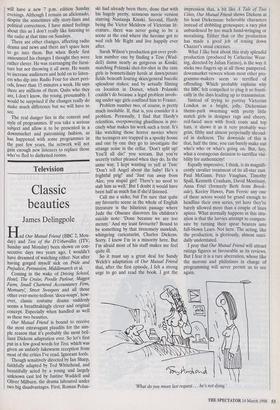Television
Classic beauties
James Delingpole
ad Our Mutual Friend (BBC 2, Mon- day) and Tess of the D'Urbervilles (ITV, Sunday and Monday) been shown on con- secutive days two years ago, I wouldn't have dreamed of watching either. Not after having gorged myself sick on Pride and Prejudice, Persuasion, Middlemarch et aL Coming in the wake of Driving School, Hotel, The Cruise, Poodle Parlour, Maggot Farm, Small Chartered Accountancy Firm, Mortuary!, Street Sweepers and all those other ever-more-tedious 'clocu-soaps', how- ever, classic costume drama suddenly seems a breathtakingly clever and original concept. Especially when handled as well as these two beauties.
Our Mutual Friend is bound to receive the most extravagant plaudits for the sim- ple reason that it's probably the most bril- liant Dickens adaptation ever. So let's first put in a few good words for Tess, which was given an unfairly lukewarm reception from most of the critics I've read. Ignorant fools.
Though sensitively directed by Ian Sharp, faithfully adapted by Ted Whitehead, and beautifully acted by a young and largely unknown cast led by Justine Waddell and Oliver Milburn, the drama laboured under two big disadvantages. First, Roman Polan- ski had already been there, done that with his hugely pretty, sensuous movie version starring Nastassja Kinski. Second, Hardy being the Victor Meldrew of Victorian lit- erature, there was never going to be a scene at the end where the heroine got to wed rich Mr Right and live happily ever after.
Sarah Wilson's production got over prob- lem number one by finding a Tess (Wad- dell) damn nearly as gorgeous as Kinski; matching Polanski shot-for-shot in the cute girls in bonnets/dairy herds at dawn/potato fields beneath louring skies/general bucolic splendour stakes; and by actually filming on location in Dorset, which Polanski couldn't do because a legal problem involv- ing under-age girls confined him to France.
Problem number two, of course, is pretty much insoluble. If, that is, you consider it a problem. Personally, I find that Hardy's relentless, overpowering ghastliness is pre- cisely what makes his work such a treat. It's like watching those horror movies where the teenagers are trapped in a spooky house and one by one they go to investigate the strange noise in the cellar. 'Don't split up! You'll all die!' you scream. But you're secretly rather pleased when they do. In the same way, I kept wanting to yell at Tess: `Don't tell Angel about the baby! He's a frightful prig!' and 'Just run away from Alec, you stupid girl! There's no need to stab him as well.' But I doubt it would have been half as much fun if she'd listened.
Call me a sicko, but I'm sure that quite my favourite scene in the whole of English literature is the hilarious passage where Jude the Obscure discovers his children's suicide note: 'Done because we are too menny.' And my least favourite? Bound to be something by that tiresomely mawkish, whingeing caricaturist, Charles Dickens. Sorry. I know I'm in a minority here. But I'm afraid most of his stuff makes me feel quite ill.
So it must say a great deal for Sandy Welch's adaptation of Our Mutual Friend that, after the first episode, I felt a strong urge to go and read the book. I got the impression that, a bit like A Tale of Two Cities, Our Mutual Friend shows Dickens at his least Dickensian: believable characters instead of dribbling grotesques; a racy plot unburdened by too much hand-wringing or moralising. Either that or the production has made a good job of toning down Chazzer's usual excesses.
What I like best about this truly splendid production (produced by Catherine Wear- ing, directed by Julian Farino), is the way it sticks two fingers up at all those pampered, downmarket viewers whom most other pro- gramme-makers seem so terrified of offending. Which probably explains why the BBC felt compelled to plug it so franti- cally in the days leading up to transmission.
Instead of trying to portray Victorian London as a bright, jolly, Dickensian theme-park swarming with pretty little match girls in designer rags and cheery, red-faced men with frock coats and top hats, it shows it as it very probably was: grim, filthy and almost perpetually shroud- ed in darkness. The downside of this is that, half the time, you can barely make out who's who or what's going on. But, hey, what a courageous decision to sacrifice visi- bility for authenticity!
Equally impressive, I think, is its magnifi- cently cavalier treatment of its all-star cast. Paul McGann, Peter Vaughan, Timothy Spall, Kenneth Cranham, David Morrissey, Anna Friel (formerly Beth from Brook- side), Keeley Hawes, Pam Ferris: any one of these actors would be grand enough to headline their own series, yet here they're barely allowed more than a couple of lines apiece. What normally happens in this situ- ation is that the luvvies attempt to compen- sate by turning their spear bearers into full-blown Lears. Not here. The acting, like the production, is gloriously, almost suici- dally understated.
I pray that Our Mutual Friend will attract ratings figures as favourable as its reviews. But I fear it is a rare aberration, whose like the morons and philistines in charge of programming will never permit us to see again.
`What do you mean last request .. . he's not dying.'


































































 Previous page
Previous page